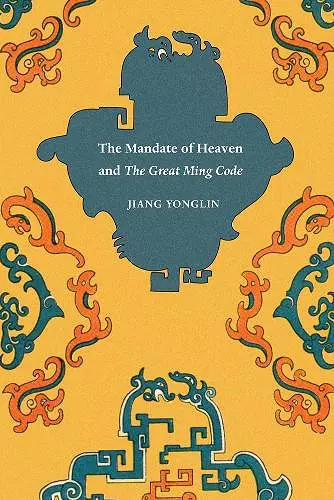The Mandate of Heaven and The Great Ming Code
Format:Paperback
Publisher:University of Washington Press
Published:1st Nov '13
Currently unavailable, and unfortunately no date known when it will be back
This paperback is available in another edition too:
- Hardback£95.00(9780295999029)

This companion volume to Jiang Yonglin's translation of The Great Ming Code (2005) analyzes the thought underlying the imperial legal code.
Analyzes the code's underlying thought in terms of the spiritual and social agenda articulated by the founder of the Ming dynasty (1368-1644), Zhu Yuanzhang.
After overthrowing the Mongol Yuan dynasty, Zhu Yuanzhang, the founder of the Ming dynasty (1368-1644), proclaimed that he had obtained the Mandate of Heaven (Tianming), enabling establishment of a spiritual orientation and social agenda for China. Zhu, emperor during the Ming’s Hongwu reign period, launched a series of social programs to rebuild the empire and define Chinese cultural identity. To promote its reform programs, the Ming imperial court issued a series of legal documents, culminating in The Great Ming Code (Da Ming lu), which supported China’s legal system until the Ming was overthrown and also served as the basis of the legal code of the following dynasty, the Qing (1644-1911).
This companion volume to Jiang Yonglin’s translation of The Great Ming Code (2005) analyzes the thought underlying the imperial legal code. Was the concept of the Mandate of Heaven merely a tool manipulated by the ruling elite to justify state power, or was it essential to their belief system and to the intellectual foundation of legal culture? What role did law play in the imperial effort to carry out the social reform programs?
Jiang addresses these questions by examining the transformative role of the Code in educating the people about the Mandate of Heaven. The Code served as a cosmic instrument and moral textbook to ensure “all under Heaven” were aligned with the cosmic order. By promoting, regulating, and prohibiting categories of ritual behavior, the intent of the Code was to provide spiritual guidance to Chinese subjects, as well as to acquire political legitimacy. The Code also obligated officials to obey the supreme authority of the emperor, to observe filial behavior toward parents, to care for the welfare of the masses, and to maintain harmonious relationships with deities. This set of regulations made officials the representatives of the Son of Heaven in mediating between the spiritual and mundane worlds and in governing the human realm.
This study challenges the conventional assumption that law in premodern China was used merely as an arm of the state to maintain social control and as a secular tool to exercise naked power. Based...
"For students interested in these and other questions concerning Chinese law or religion in the late imperial period, Jiang’s learned study should be an obvious starting point."
-- Leo K. Shin * Journal of Chinese Religions *"This book is a very important contribution to the field of Chinese legal history."
-- Pär Cassel * China Review International *"The book is a necessary correction to the conventional views [that Chinese law was irrational, entirely secular, and an instrument of state control] . . . the book remains a welcome addition to the literature on traditional Chinese law."
-- Ziaoqun Xu * Frontiers of History in China *"Arguing against a scholarly tradition that sees Chinese law as a purely secular instrument of despotic power, Jiang Yonglin seeks to place that tradition in the context of a China-centered Chinese history. . . . A learned and thoughtful work."
-- Michael Marmé * Journal of Asian Studies *"A welcome addition to the field. A fresh look at the cosmological foundation of imperial Chinese law. An excellent starting point for future inquiries and makes a significant contribution to the discussion of Chinese law and religion."
-- Weiting Guo * H-Law *"Students of Ming China and readers of Chinese history and legal history more broadly are indebted to Jiang Yonglin for this important study that casts much light on the Great Ming Code (Da Ming lu大明律) and its world. This reviewer certainly learned a lot and is confident that scholars will be referring to Jiang’s work, alongside his translation of the Code, for years to come."
-- Desmond Cheung * Ming Studies *"Through an analysis of how the Ming ruling elite classified what was lawful and unlawful, pure and polluted, Jiang has opened a window to the culture and worldview of the early Ming and how these shaped the writing of the Code. His work discloses the nuances in the primary sources through a compelling narrative and presents a truly China-centred approach."
-- Elif Akçetin * International History Review *"Eloquently challenges the extant mainstream ideas about the alleged “secular” and “suppressive” nature of Chinese legal culture."
-- Pengsheng Chiu * Journal of the Economic and Social History of the OrieISBN: 9780295993430
Dimensions: unknown
Weight: 340g
256 pages